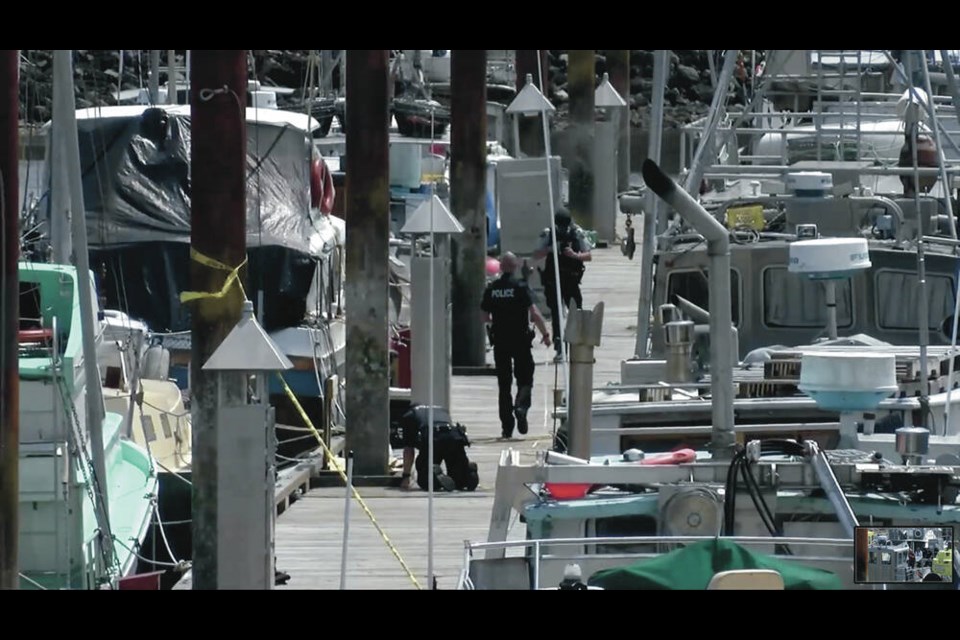Police involved in a tense standoff with an armed man who had earlier taken hostages and killed a man at a Campbell River marina last year fired 31 shots into the man’s docked vessel, according to a report released Monday by the Independent Investigations Office of B.C.
The report gives a detailed look at what happened during the standoff at Campbell River’s Discovery Marina in June 2022.
It says members of the Emergency Response Team opened fire after hearing a gunshot on the boat that turned out to be the man using the gun on himself.
The civilian oversight agency said the man died from a single “shotgun blast … clearly self-inflicted” during the incident in the early hours of June 13.
Nine postmortem wounds on the man’s body were the result of shots fired by three police officers on the dock through the tarped back entrance to the boat, and were “in response to the [man’s] single shot, which were justifiable in the circumstances,” said the report by Ron MacDonald, chief civilian director of the IIO.
Officers had already confirmed that the man had shot and killed another person on a nearby vessel, was still armed and had talked about taking hostages and killing others, including police, said the IIO report.
The homicide victim was identified by family as Ryan Langlois, a father to a teenage son and nine-year-old daughter who lived on a boat that he used to operate a dive fishery.
After killing Langlois, the man held two hostages on his boat for about four hours. After the first hostage was released, he called 911 at about 1:41 a.m.
The second hostage was released at about 2 a.m. just as police were arriving at the docks. The hostage told police the man had firearms and was alone on the boat. Others at the marina informed police the man was intoxicated.
At about 5 a.m., police were given a text by a friend of the man saying he had a loaded gun, that he was “not going to come off that boat alive” and that he had “every intention of making the police do the deed.”
A crisis negotiator made contact with the man on the boat by phone, saying police were present and asking him to surrender. The man said he would do so in two minutes after he got dressed, then hung up despite being asked to stay on the line. At the time, the negotiator said the man “was not confrontational at all.”
An officer with a partial view into the boat then saw the man moving around “in an agitated way” and witnessed him holding a gun and pointing it to his head.
A few minutes later, the man appeared from behind the boat’s tarp and looked down the dock at police, who were pointing their weapons.
He was ordered to surrender, but gave the officers “a gesture” and moved in to the boat’s cockpit area.
The man was contacted again at 5:34 a.m. and this time sounded angry, according to the IIO report. He told the negotiator he had three guns and would shoot police.
One officer saw the man with a phone in one hand and rifle in the other. He put the phone down and moved to the dock side of the vessel, “holding the long gun in a low-ready position.”
Officers saw the barrel of the gun appear from behind the tarp and turn to point at police before being withdrawn.
“There were shouts of ‘drop the gun,’ and officers saw a muzzle flash and heard a gunshot, said the IIO report. ERT members then fired a volley of rounds into the back of the boat.
“[Showing] the muzzle of a firearm from behind a tarp made it difficult or impossible to discern his movements or intentions,” said the IIO report. “When he fired the single shot from his shotgun, it was reasonable for the ERT members, who were only several metres away, to fear death or grievous bodily harm and to respond with deadly force.”
The man was found dead behind the black tarp.
On the dock next to his boat was a single-shot 12-gauge shotgun with an expended shell in the breech.
Officers also found a loaded semi-automatic .22 calibre rifle in the wheelhouse of the boat.
Autopsy reports attributed the death to a single shotgun wound through the mouth. Toxicology reports indicated a “heavy level of intoxication with ethanol.”
MacDonald concluded there were no reasonable grounds to determine that police committed an offence and the matter won’t be forwarded to Crown for consideration of charges.



